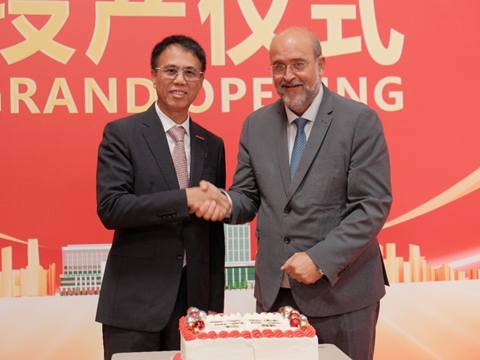
KINGFA’s Environmental SCI & TECH Spain subsidiary has inaugurated its Montalbo chemical recycling facility, expected to reach an annual capacity of 30,000 tons of ‘high-performance’ recycled plastics and bolster Spain’s plastic waste recycling system.
Its advanced recycling technology is set to unlock ‘high-value’ circularity for plastic waste, with the Spanish facility’s recycling capabilities described as ‘full-process’, ‘high-quality’ and a ‘significant breakthrough’ for circular economy infrastructure.
Furthermore, KINGFA aims to expand its presence on the European market in the areas of plastic waste recycling, life cycle management, and low-carbon material solutions.
The Environmental SCI & TECH Spain subsidiary is also considered a step towards KINGFA’s ‘1438 Strategy’, referring to its target revenue of 100 billion yuan by 2030 – 10 billion yuan from healthcare, 40 billion yuan from green petrochemicals, 30 billion yuan from new materials, and 80 billion yuan from the modified plastics sector.
José Luis Martínez Guijarro, first vice president of Castilla-La Mancha, is optimistic that the project will serve as a ‘model’ for green transformation amidst the Spanish government’s efforts to optimize industrial policies, boosting innovation and resource regeneration.
Meanwhile, Cao Yan, science and technology counselor at the Chinese Embassy in Spain, hopes that the Montalbo facility will enable collaboration between Europe and China in pursuit of green solutions, driving advancements in technology, industry upgrades, and environmental solutions.
ALPLA has also opened a new plant this month, this one in Thailand. It is the Chachoengsao region’s first STUDIOa ‘one-stop-shop’ for customers to design and develop packaging products alongside ALPLA, and is set to produce plastic bottles, preforms, matching closures, and other packaging components using one-step injection stretch-blow and injection moulding.
Meanwhile, the European Commission has approved a €500 million French scheme to covert mixed and/or contaminated chemicals into ‘virgin-like’ raw materials via chemical recycling. Trays, films, non-beverage bottles and textile materials with a certain amount of polyester content are set to be treated under the scheme.
If you liked this story, you might also enjoy:
Reuse vs. single use – which is better for the environment?
Sustainable Innovation Report 2025: Current trends and future priorities
What can the world learn from South Korea’s world-leading performance in plastics circularity?













No comments yet